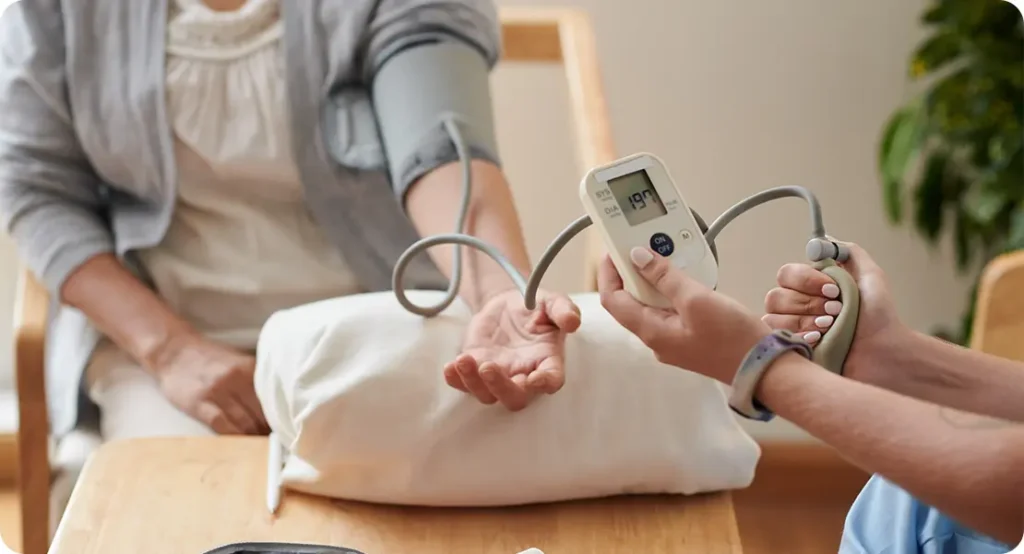If you’ve been told you need cataract surgery but also have high blood pressure that isn’t quite under control, you’re probably wondering whether it’s safe to proceed. It’s a very valid concern. Cataract surgery is generally quick and minimally invasive—but it’s still a surgical procedure, and your cardiovascular health can play a significant role in how safely that procedure goes.
In this article, we’ll walk through what the latest research and anaesthetic guidelines say about performing cataract surgery on patients with uncontrolled hypertension. We’ll also unpack when surgery should be delayed, the risks of proceeding regardless, and what practical steps can be taken to reduce complications.
What Exactly Counts as ‘Uncontrolled’ Hypertension?
Let’s start by clarifying what we mean by “uncontrolled” high blood pressure. Most clinicians consider a blood pressure reading persistently above 160/100 mmHg to be poorly controlled. Some guidelines tighten this threshold even more, particularly for older patients or those with multiple cardiovascular risk factors. A single high reading doesn’t necessarily mean you’ll be turned away from surgery—but consistently elevated values are a red flag.
In the context of eye surgery, including cataract procedures, the cut-off for same-day cancellations usually hovers around a systolic reading of 180 mmHg or more, or a diastolic reading over 110 mmHg. At that level, the risks associated with anaesthesia and surgical stress start to climb noticeably. These thresholds are especially important because cataract surgery, while quick, can still trigger cardiovascular events in vulnerable individuals.
Your GP or ophthalmologist might still give the green light for surgery if your readings are just borderline and stable. But if you’ve had recent spikes, experienced headaches, dizziness, or chest pain, most clinicians will advise delaying the operation.
Why Is Blood Pressure Such a Concern During Cataract Surgery?
You might be wondering—why does blood pressure matter so much for something as ‘simple’ as cataract surgery? The procedure may be short and often done under local anaesthetic, but it still places physiological stress on your body. Here’s why elevated blood pressure is a genuine concern:
- Increased Risk of Cardiovascular Events
Hypertension increases the likelihood of perioperative events like heart attacks, arrhythmias, and strokes. Even under local anaesthetic, the anxiety and stimulation of surgery can push an already elevated blood pressure higher, potentially triggering a cardiac event during or shortly after the operation. - Anaesthetic Safety
Local anaesthetics with vasoconstrictors (such as lidocaine with adrenaline) are commonly used during cataract surgery. These compounds can temporarily raise blood pressure or trigger cardiac arrhythmias—especially in patients whose cardiovascular system is already under strain. - Ocular Perfusion Pressure Instability
The eye is a highly sensitive organ when it comes to blood flow. Extremely high or low systemic blood pressure can impair ocular perfusion, potentially increasing the risk of ischaemic complications during surgery. Poor perfusion could theoretically compromise optic nerve function or delay visual recovery.
In essence, high blood pressure turns a low-risk procedure into something more precarious. That’s why many surgical centres have adopted stricter pre-op screening protocols in recent years.
What the Guidelines Say: When to Delay Cataract Surgery

Recent perioperative guidelines—especially those emerging from anaesthetic societies like the Association of Anaesthetists of Great Britain and Ireland (AAGBI)—have started to take a more standardised view on hypertension thresholds.
Here’s a simplified breakdown of when most clinicians would consider delaying surgery:
- Systolic BP > 180 mmHg or Diastolic BP > 110 mmHg: Surgery is typically postponed until blood pressure is better managed.
- BP between 160–180/100–110 mmHg: Often a case-by-case decision. Surgery might proceed if there are no other red flags, but ideally, pressure should be optimised first.
- Marked blood pressure variability or hypertensive symptoms: Delay strongly advised.
- Presence of end-organ damage (such as left ventricular hypertrophy or renal impairment): Careful multidisciplinary review recommended before proceeding.
These recommendations are not arbitrary. They’re backed by outcome studies that show increased incidence of intraoperative and postoperative complications when these thresholds are exceeded.
What Could Go Wrong If You Ignore High Blood Pressure?
So what happens if surgery proceeds despite significantly elevated blood pressure?
- Intraoperative Hypertensive Crises
This refers to a sudden spike in blood pressure during surgery. While rare, such events can lead to cardiac arrhythmias or acute heart failure, especially in those with pre-existing coronary artery disease. - Retrobulbar Haemorrhage
One of the most serious ophthalmic complications linked to hypertension. Retrobulbar haemorrhage occurs when blood collects behind the eye, potentially causing orbital compartment syndrome. This can compress the optic nerve and lead to permanent vision loss if not managed immediately. - Stroke or Transient Ischaemic Attack (TIA)
Postoperative TIAs and strokes are more common in hypertensive individuals undergoing surgery, even minor operations. The stress of surgery, fluid shifts, and interruptions in regular medications can all contribute to cerebrovascular instability.
These are rare outcomes—but the point is, they’re preventable. That’s why many eye surgeons and anaesthetists prefer to err on the side of caution and reschedule if your readings are too high.
Special Considerations: White Coat Hypertension and Pre-Op Anxiety
Many patients see their blood pressure spike in the clinic but are otherwise stable at home. This phenomenon—called white coat hypertension—is quite common. It can make pre-op assessments a little tricky.
In such cases, your team might:
- Ask you to provide home BP readings or 24-hour ambulatory monitoring results.
- Delay surgery only briefly while confirming that your usual pressures are within a safer range.
- Use short-acting antihypertensives immediately before surgery to reduce intraoperative risk.
This nuance matters, as postponing surgery unnecessarily can disrupt treatment plans, particularly for older adults at risk of falls or declining vision-related quality of life.
What You Can Do as a Patient
If you’re managing hypertension and planning for cataract surgery, here’s how you can set yourself up for a smooth experience:
- Get a Recent Medication Review
Make sure your antihypertensive regimen is up-to-date. Sometimes, a single adjustment can bring readings down into the safe zone within days. - Track Your BP at Home
Document morning and evening readings for at least 7–10 days leading up to your pre-assessment. This gives your surgical team more data to work with and helps distinguish anxiety spikes from chronic hypertension. - Avoid Missed Doses
Don’t skip your medications on the day of surgery unless your clinician has advised you otherwise. Skipped antihypertensives can lead to rebound hypertension—ironically raising your risk just when you’re supposed to be monitored. - Manage Stress
If anxiety is causing your pressure to spike, discuss this with your doctor. Light sedation or pre-op anxiolytics can be considered to reduce physiological stress without compromising eye surgery outcomes.
Being proactive with your blood pressure management gives you the best chance of having surgery go ahead as scheduled.
What the Research Says: Perioperative Outcomes and Hypertension
Studies evaluating perioperative risk in cataract patients with hypertension have found some consistent themes:
- Patients with controlled hypertension fare just as well as normotensive patients.
- Those with severely uncontrolled hypertension have a measurable increase in cardiac complications, particularly arrhythmias.
- Use of regional anaesthesia (as opposed to general) significantly reduces risk in this group.
- Multidisciplinary pre-operative optimisation clinics are effective in reducing cancellation rates and improving outcomes.
One large-scale UK study published in Anaesthesia journal found that almost 12% of same-day cancellations in ophthalmic theatres were due to elevated blood pressure. A significant proportion of these could have been avoided with better community-level blood pressure control and earlier medication reviews.
Should the Threshold Be Lower in Older Patients?
This is a subtle but important question. Many cataract patients are in their 70s or 80s—and this group often has “stiffer” arteries, meaning their blood pressure runs higher by default. Should we be holding them to the same cut-off values?
Most guidelines suggest a nuanced approach. If an older patient is asymptomatic, on stable medication, and has no history of end-organ damage, they may still be cleared for surgery even if their readings are slightly above conventional thresholds. Again, the decision should be made collaboratively with input from a GP or cardiologist if needed.
Frequently Asked Questions

- Can I have cataract surgery if my blood pressure is high on the day?
It depends on how high it is. If your systolic blood pressure is over 180 mmHg or your diastolic is over 110 mmHg, most clinics will postpone the surgery. These levels pose a higher risk of complications such as stroke, heart issues, or bleeding behind the eye. If it’s only slightly elevated due to nerves or a one-off spike, your surgical team might recheck it later or use calming techniques before proceeding. - Why is high blood pressure a problem for cataract surgery if it’s just a local anaesthetic?
While cataract surgery often uses local anaesthesia, it still causes physical and emotional stress, which can raise blood pressure even more. In patients with uncontrolled hypertension, this additional spike can trigger dangerous events like arrhythmias or bleeding. Even minor eye surgeries need your cardiovascular system to be stable to ensure safe recovery. - What happens if my blood pressure is too high before surgery?
If your readings are above the safety threshold, your surgery will likely be postponed. Your doctor may refer you back to your GP to review your medication and stabilise your blood pressure. This delay might feel frustrating, but it’s in place to keep you safe. Most patients can rebook within a few weeks after better control is achieved. - Can anxiety raise my blood pressure before surgery?
Absolutely. Many people experience what’s called “white coat hypertension,” where stress or anxiety in a medical setting causes their blood pressure to spike. If your team suspects this, they may ask for home readings or give you time to relax before taking another measurement. Sometimes, a mild sedative is used to reduce anxiety and bring your reading down safely. - Will I need to stop taking my blood pressure medication before surgery?
In most cases, no. You should continue taking your usual antihypertensive medications unless specifically told otherwise by your surgical or anaesthetic team. Stopping suddenly can cause rebound hypertension, which is more dangerous. Always double-check with your surgeon or GP about your medication plan for surgery day. - How can I get my blood pressure under control before cataract surgery?
Speak to your GP or nurse about adjusting your medication if your blood pressure is running high. Regular home monitoring, reducing salt, cutting back on alcohol, managing stress, and exercising can all help. It’s also important to take your medicines exactly as prescribed, especially in the days leading up to your operation. - Can high blood pressure affect my vision after surgery?
It’s rare, but very high blood pressure can increase the risk of bleeding behind the eye during or after surgery, which may delay healing or affect your vision temporarily. In severe cases, uncontrolled hypertension may raise the risk of optic nerve damage. That’s why surgeons take your blood pressure seriously before proceeding. - What if my blood pressure is only high at the clinic but normal at home?
This is quite common and known as “white coat hypertension.” If your readings are usually normal at home but spike in medical settings, your doctor may ask for a log of your home blood pressure readings or recommend 24-hour ambulatory monitoring. If the overall picture shows good control, your surgery may still go ahead as planned. It’s helpful to bring a record of your recent home readings to your pre-assessment appointment. - Does delaying cataract surgery because of blood pressure increase the risk of vision loss?
In most cases, a short delay to manage blood pressure properly won’t lead to permanent vision loss. However, if cataracts are already quite advanced, postponing surgery for too long could affect your quality of life and increase your risk of falls or accidents. The key is to balance safety with timely care. Your ophthalmologist will guide you on how soon the procedure should ideally be performed once your blood pressure is under control.
Final Thoughts
To answer the question: yes, cataract surgery may need to be delayed in patients with uncontrolled hypertension—but not always. It depends on how high the readings are, how stable they’ve been over time, and whether other cardiovascular risks are present. The goal isn’t to deny you sight-restoring treatment—it’s to make sure it’s done safely and without avoidable complications.
If you’re preparing for cataract surgery and your blood pressure has been fluctuating or trending high, don’t wait until the pre-op appointment to act. Speak to your GP early, track your readings at home, and get your medications reviewed if needed.
At London Cataract Centre, our team of cataract surgeons, anaesthetists, and pre-assessment nurses work together to ensure every patient is optimally prepared. If your blood pressure isn’t quite where it should be, we’ll help guide you towards stabilising it—so you can proceed with peace of mind and get back to clear vision safely.
References
- National Institute for Health and Care Excellence (2019). Hypertension in adults: diagnosis and management (NICE Guideline NG136). Available at: https://www.nice.org.uk/guidance/ng136 (Accessed: 13 June 2025).
- Healthcare Improvement Scotland (2024). Cataract surgery standards (v2.0). Available at: https://www.healthcareimprovementscotland.scot/wp-content/uploads/2024/02/20231215-Cataract-surgery-standards-v2-0-Final.pdf (Accessed: 13 June 2025).
- Royal College of Anaesthetists & Royal College of Ophthalmologists (2012). Local anaesthesia for ophthalmic surgery – guidelines. Available at: https://www.ncbi.nlm.nih.gov/pmc/articles/PMC3376304/ (Accessed: 13 June 2025).

